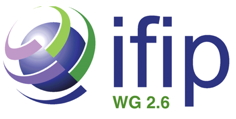Aims
- For the benefit of society, to promote visibility and to increase the impact of research and development in the database area, especially in the fields defined in the scope of the working group.
- To promote quality and relevance of academic and industrial research and development in the database area.
- To promote ethical behavior and appropriate recommendations or guidelines for research related activities, for example, submission and selection of publications, organization of conferences, allocation of grants and awards, and evaluation of professional merits and curricula.
- To promote cooperation between researchers and with other established bodies and organizations pursuing the above aims.
- To contribute to assessing the scientific merits and practical relevance of proposed approaches for data and knowledge management.
Scope
The notion of database has evolved to include systems that accept, describe, store and enable manipulation and presentation of data, information and knowledge in a wide spectrum of forms, ranging from tuples to rules, text, images, sounds and others, with their corresponding operators, usage and management.
The group's interest covers formalisms, models, architectures, techniques and methodologies for the purpose of designing and realizing such database systems.
These currently include in particular:
- New models, languages and theories for database design and representation.
- New architectures and techniques, e. g. data warehouses, data mining, multimedia and spatio-temporal databases.
- Impact of new communication technologies, such as Internet, broadband networks or wireless communications
- Understanding, reuse and interoperation of existing data stores.
- Visual user interfaces and information visualization.
- New methodologies for building database applications.
